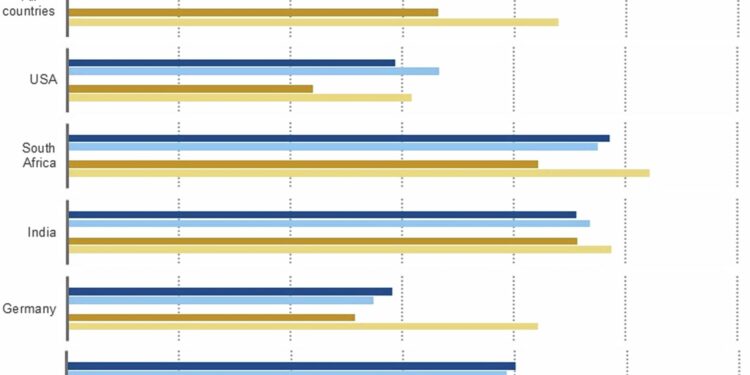Acceptability of rationing and taxation of fossil fuels and high climate impact foods in all countries. Credit: Communication in human and social sciences (2024). DOI: 10.1057/s41599-024-03823-7
Rationing goods such as meat and fuel can reduce consumption effectively and equitably, with high climate impact. Nearly 40% of the population says they are ready to accept such measures. These are the findings of new research from the Climate Change Leadership Group at Uppsala University.
“Rationing may seem dramatic, but so is climate change. This may explain why support is rather high. One advantage of rationing is that it can be seen as fair, if it is independent of income .
“Policies that are perceived as fair often enjoy higher levels of acceptance,” says Oskar Lindgren, a doctoral student in natural resources and sustainable development at the Department of Earth Sciences at Uppsala University, who led the study. now published in Communication in human and social sciences.
To achieve climate goals, policies that effectively reduce consumption with a high climate impact, such as meat and fuel, are necessary. At the same time, public acceptance of a particular policy instrument depends heavily on whether it is perceived as fair or not.
So far, research in this area has primarily examined economic instruments, such as carbon taxes, and paid little attention to other instruments that might be effective, such as rationing.
The new study of nearly 9,000 people in Brazil, India, Germany, South Africa and the United States compares the acceptability of rationing fuel and so-called “emissions-intensive” foods, such as meat, with the acceptability of taxes on these same products. .
One conclusion is that the acceptability of rationing is comparable to the acceptability of taxes. For example, 38% of respondents supported or strongly supported fuel rationing. The corresponding figure for fuel tax was 39%.
“Most surprising is that there is virtually no difference in acceptability between rationing and taxing fossil fuels. We expected rationing to be viewed more negatively because it directly limits people’s consumption .
“But in Germany, the proportion of people who strongly oppose fossil fuel taxes is actually higher than those who strongly oppose fossil fuel rationing,” notes Mikael Karlsson, lecturer in climate leadership at Uppsala University and one of the researchers behind the study.
The study also shows that acceptability differs between countries. In India and South Africa, rationing of fuel- and emissions-intensive foods is more acceptable than in other countries.
In particular, many respondents in Germany and the United States are strongly opposed to meat rationing. People who express concern about climate change are more likely to favor this instrument, but younger and more educated people also have more positive attitudes.
“More research is now needed into attitudes towards rationing and the design of such policy instruments. Water rationing is in effect in many parts of the world, and many people appear willing to limit their consumption for climate change mitigation purposes, provided others do so. These are encouraging results,” says Lindgren.
More information:
Oskar Lindgren et al, Public Acceptability of Climate-Driven Rationing, Communication in human and social sciences (2024). DOI: 10.1057/s41599-024-03823-7
Provided by Uppsala University
Quote: Study finds about 40% of public supports rationing measures to combat climate change (September 30, 2024) retrieved September 30, 2024 from
This document is subject to copyright. Except for fair use for private study or research purposes, no part may be reproduced without written permission. The content is provided for informational purposes only.



